Greg O’s Garage; HBO’s The Gilded Age, Long Island and the Vanderbilts Part 2
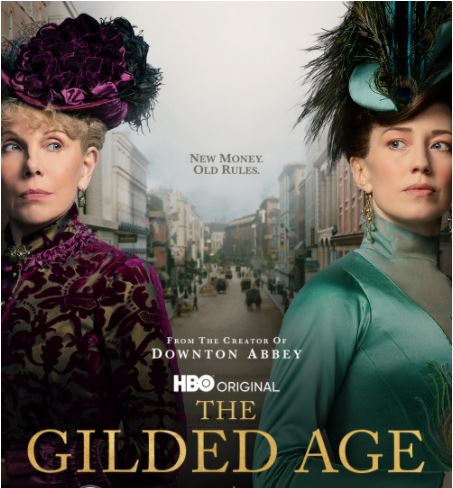
HBO's excellent new series 'The Gilded Age' has many connections, real and fictional, to NYC, Long Island and the Vanderbilt family. If you've yet to see it, and are a regular reader here, this new series is highly recommended.
While it is a fictional series detailing the rise and acceptance of a 'new money' family, The Russells, into the 'old money' guard of the gilded age society of New York, there are plenty of factual characters and locations within the show to keep any history aficionado happily entertained.
The first thing a watcher will notice is the thinly veiled portrayal of the Vanderbilt family by the fictional Russell family of the show. George Russell maybe represents William K. Vanderbilt, Willie K's father. Matriarch Bertha Russell exhibits the same drive and determination of Alva Vanderbilt attempting to rise through the ranks of the Astors and New York's social elite in New York's gilded age of the 1870's through 1910. Set in the early 1880's, the show, writers, producers and cast have all done their homework to ensure relative historical accuracy. So accurate, that aside from the wardrobe and story lines, many of the sets and locations are the actual residences of gilded age families.
This post, part 2, will examine some of the cast of fictional characters in the show with factual characters in the next post.
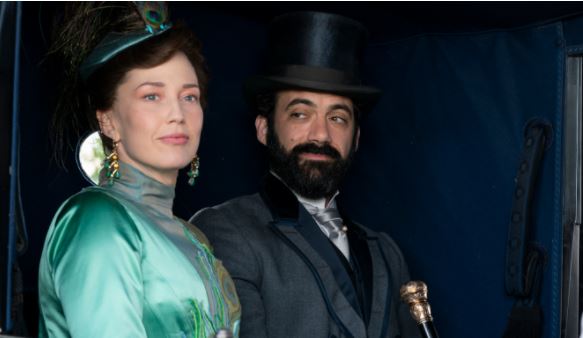
In HBO's Gilded Age, the wealthy fictional family of the Russells are 'new money' attempting to rise up through the social ladder of old money Knickerbocker families of New York. Writer and Producer Julian Fellowes uses the fictional Russells to represent the Vanderbilt family and give him a creative license to write a fictional story within the confines of factual history and people.
But whom of the Vanderbilts do the fictional Russells represent? Some are obvious, while others not so much.
The Russell Family
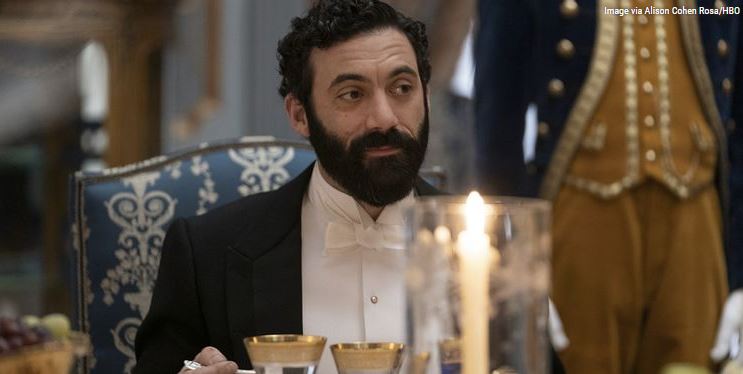
George Russell; played by Morgan Spector
Successful and ruthless, the family patriarch George, has been described as similar to Cornelius 'The Commodore' Vanderbilt (May 27, 1794 – January 4, 1877) in his drive to build his railroad empire. An early episode sees a railroad competitor calling him a bastard for attempting to put him out of business, to which George replies; "I may be a bastard, Mr. Thorburn, but you are a fool -- and of the two, I think I know which I prefer." giving the viewer an instant sense of whom we're dealing with.
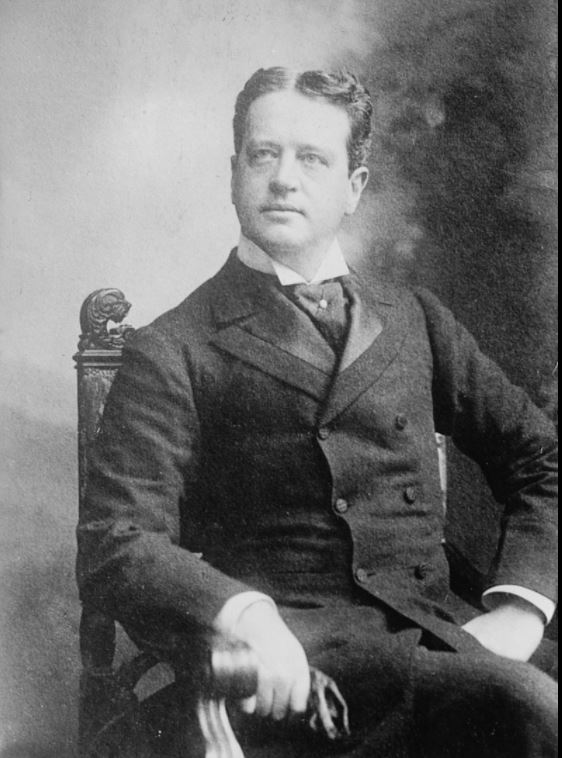
The reality would be more correct to think of him as a conglomeration of many Vanderbilt figures. He has the drive of the Commodore Vanderbilt, or his son, William Henry Vanderbilt (May 8, 1821 – December 8, 1885). However, being raised in the lower classes, the Commodore was known to be somewhat crude. The extremely refined George Russell in this regard can be better thought of a 3rd, or later Vanderbilt generation like a William K. Vanderbilt Sr. (December 12, 1849 – July 22, 1920).
A big divergence with Willie K comes in the form of their marriages. George is in love and completely devoted to his wife Bertha, going so far as to reject the advances of an ambitious lady's maid within the house. While Willie K Sr. separated from Alva Vanderbilt in a scandalous divorce of the time due to alleged extramarital affairs.
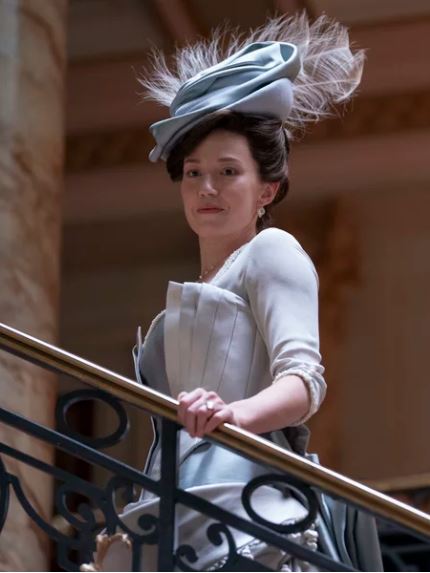
Bertha Russell; played by Carrie Coon
Matriarch Bertha Russell is a woman very motivated to be accepted into the old money families in New York. Her determination to gain acceptance is almost to the point of detriment as displayed by her disregard for George's legal problems as they would affect her standings within a later episode.
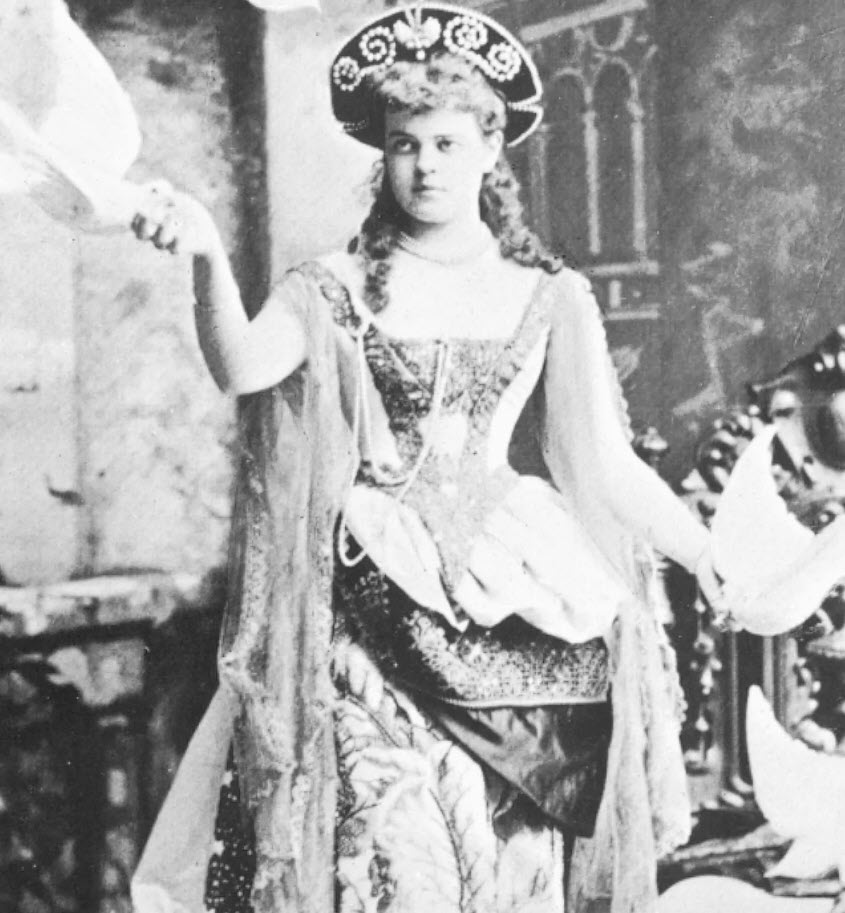
Bertha is easy to spot as standing in for Alva Erskine Vanderbilt (January 17, 1853 – January 26, 1933), later Belmont.
The direct parallels are obvious to see. Alva, born in Mobile, Alabama to very modest means of her cotton-broker father, she married William K. Vanderbilt Sr. on April 20th, 1875. Her desire to be included into Mrs. Caroline Astor's '400' social circle is a very well-known story historically. Feeling snubbed by Mrs. Astor, Alva did not extend an invitation to daughter Carrie Astor to her 750-guest housewarming party forcing Mrs. Astor to come calling hat in hand for an invite. It was then the Vanderbilts had finally arrived.
Another well-known fact about Alva was her desire to marry off daughter Consuelo Vanderbilt to British aristocracy to further increase her standings within the Astor social circles.
Shocking society in March of 1895, Alva divorced William K. Vanderbilt Sr and married the wealthy Oliver Hazard Perry Belmont the following year. Later becoming a prominent figure in the women's suffrage movement. While within the realm of fictional possibilities, I don't foresee the same future for Bertha Russell.
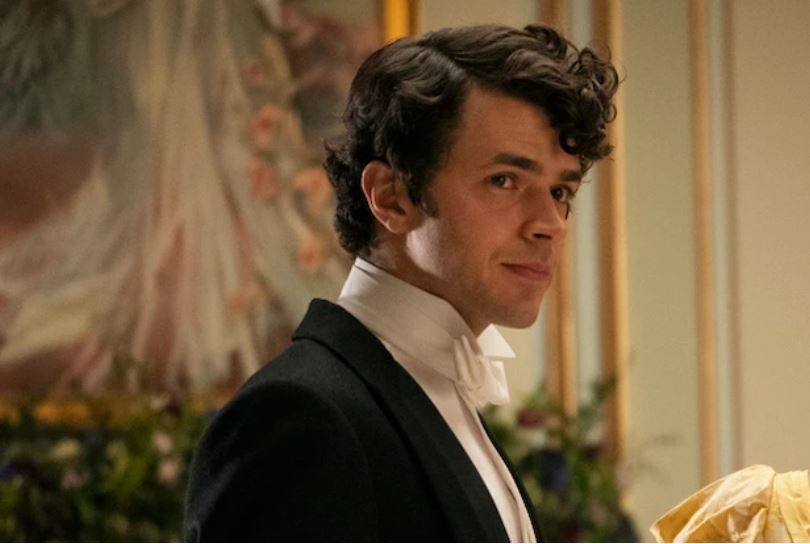
Larry Russell; played by Harry Richardson
The son of Bertha and George.
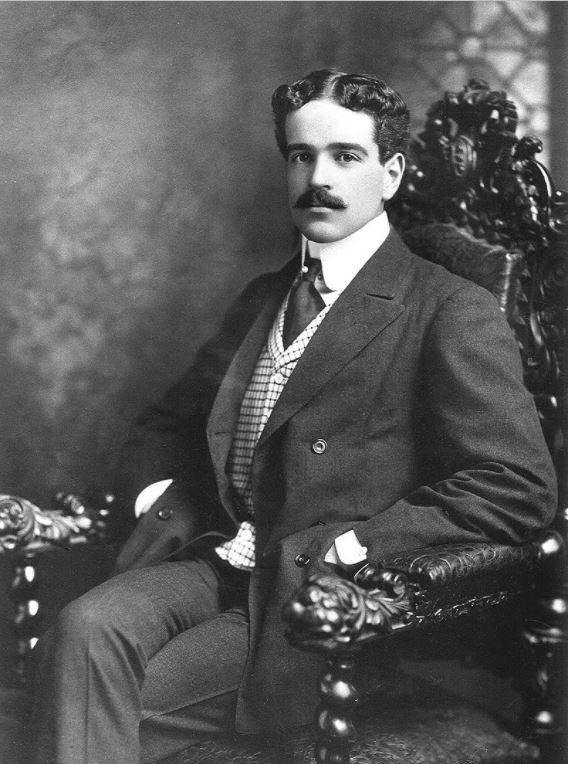
If George is Willie K. Sr., and Bertha is Alva, could Larry Russell possibly Willie K. Jr.?
While not much background has shaped Larry's character yet, it's not likely. Willie K Jr. would have been only 4 years old in 1882 during which the time the show takes place. Willie K. Jr. was also known for his love of automobiles and powerboats. The show's timeline takes place long before their development also making the similarities even further apart.
Another distinction is Larry's desire to not join the family railroad business and mentor under real-life character Stanford White to become an architect despite the displeasure this causes with his father George. Willie K. Jr. did indeed go into the family railroad business and still enjoy his auto and powerboat passions. (Fun fact; One of Willie K's first powerboats was named 'The Hard-Boiled Egg' because it was 'hard to beat')
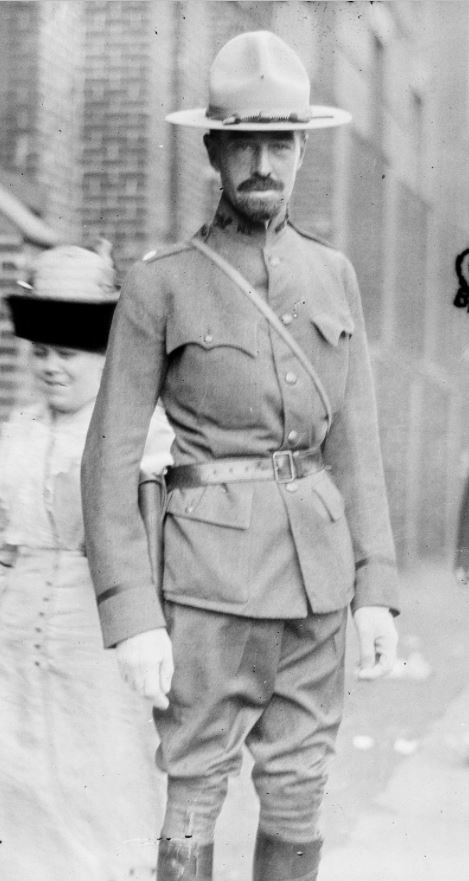
The best parallel to any particular Vanderbilt and Larry would most likely be Cornelius Vanderbilt III (September 5, 1873 – March 1, 1942) cousin to Willie K. Jr.
Disowned by his father and family for a marriage they did not approve of, Cornelius III, like Larry, blazed his own path at Yale in pursuit of his own interests. Eventually Cornelius III achieved over 30 patents and even and partnered with August Belmont Jr. to establish the Interborough Rapid Transit Company for the construction of the NYC's first subway.
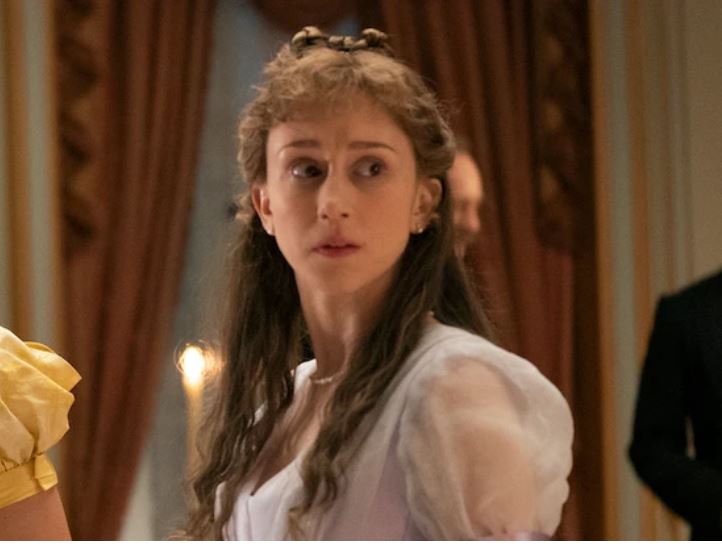
Gladys Russell; played by Taissa Farmiga
Gladys, the young daughter of Bertha and George is almost ready for her coming out at her debutante ball.
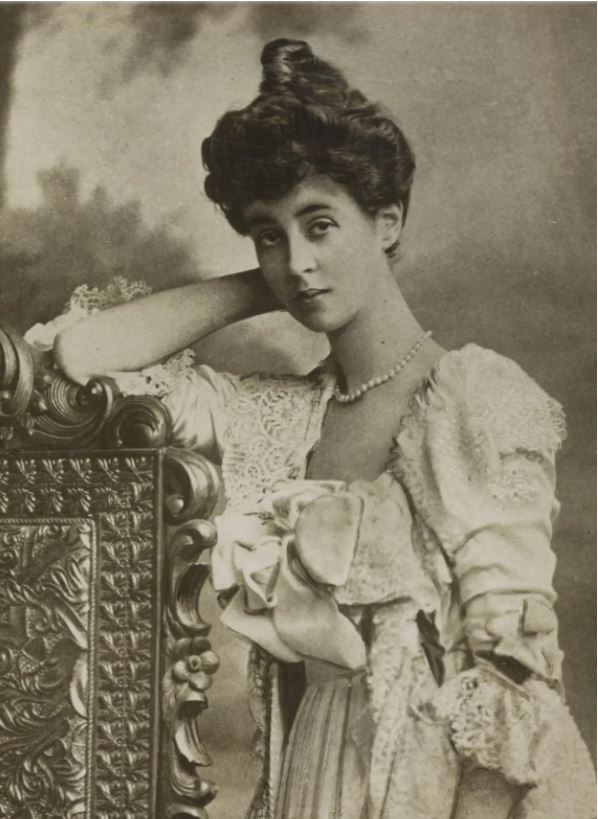
Like Bertha, Gladys is an easy character to spot her inspiration. Clearly, she is portraying Consuelo Vanderbilt (March 2nd,1877 – December 6th, 1964) daughter of Willie K. Sr. and Alva Vanderbilt.
Consuelo suffered under the rule of her mother Alva due to Alva's singular desire of marrying her to highest ranking British aristocracy she could find. Alva was abusive and even whipped her with a riding crop for small infractions. When, as a teenager, Consuelo objected to the clothing her mother had selected for her, Alva told her that "I do the thinking, you do as you are told." Desiring to marry, and even going so far as getting secretly engaged to American Winthrop Rutherfurd, she was locked in her room at Marble House in Newport to thwart any further relationship with Rutherfurd.
When Alva feigned a heart attack over the entire situation, Consuelo finally acquiesced and did marry Charles Spencer-Churchill, 9th Duke of Marlborough, chatelain of Blenheim Palace despite her dislike for him.
While Bertha is not abusive to Gladys, it is very apparent that she shares the same desires as real-life Alva for Gladys. In upcoming episodes, we'll see if this is truly the case.
The next post will look at more of the real-life, factual characters of the show, in particular, architect Stanford White and his associations with the gilded age society.

Comments